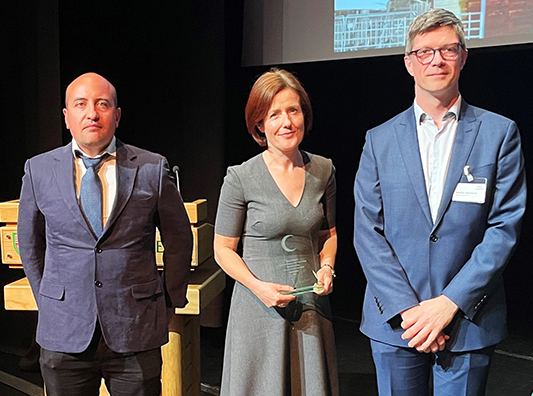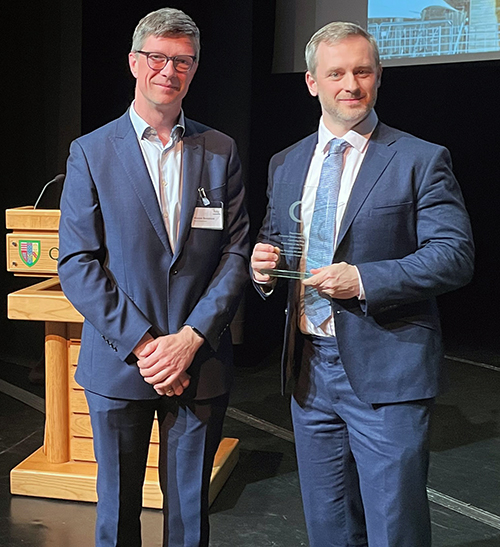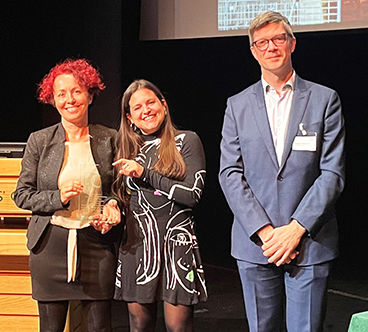
Submitted by Rachel Gardner on Fri, 19/04/2024 - 11:23
A world-leading British semiconductor company; a project investigating how robots could help boost our mental wellbeing; an email app so fast it promises to give users four hours back a week; and leading research into deterministic parsing. These are the winners of our annual Hall of Fame Awards, which were presented on Thursday 18 April in a ceremony at Queens' College.
Company of the Year: Arm
 Company of the Year went to Arm, a global company, with 43 offices in 21 countries and more than 6,000 employees worldwide, including nearly 3,000 in the UK with its global headquarters in Cambridge. Born here in 1990 with the goal of designing a computer intended to run on a battery. Its success since then in designing, architecting, developing and licensing high-performance, low-cost and energy-efficient CPUs
Company of the Year went to Arm, a global company, with 43 offices in 21 countries and more than 6,000 employees worldwide, including nearly 3,000 in the UK with its global headquarters in Cambridge. Born here in 1990 with the goal of designing a computer intended to run on a battery. Its success since then in designing, architecting, developing and licensing high-performance, low-cost and energy-efficient CPUs — the 'brain' of all computers and many household and electronic devices — helped fuel the smartphone revolution and has made Arm a household name. Its worth was recognised in autumn 2023 when it was floated on the Nasdaq Global Select Market in an offering that valued it at $54 billion.
Arm has long had a research relationship with the Department. Most notably, this has led to the development of a potentially game-changing new cybersecurity technology, focusing on new ways to design the architecture of a computer’s central processing unit to make software less vulnerable to security breaches. The technology, CHERI, extends conventional architectures and software stacks with novel hardware support for memory protection and secure encapsulation. Since early 2022, an industrial demonstrator of the technology has been made available to UK companies for testing through the UK government’s £200 million Digital Security by Design programme.
Above: MPAM Lead Architect Matteo Andreozzi and Research Ecosystem Director Andrea Kells received the Company of the Year Award on behalf of Arm from Head of Department Prof Alastair Beresford.
 Publication of the Year: flap: A Deterministic Parser with Fused Lexing
Publication of the Year: flap: A Deterministic Parser with Fused Lexing
After a Department-wide selection process that saw almost 50 papers submitted and considered, Publication of the Year was awarded to Jeremy Yallop, Ningning Xie and Neel Krishnaswami for their paper flap: A Deterministic Parser with Fused Lexing.
Left: Prof Jeremy Yallop receives the Publication of the Year award from Alastair Beresford.
Product of the Year: Superhuman
Product of the Year was awarded to super-fast email app Superhuman, founded by Rahul Vohra in in 2014. Targeted at users who want to improve their productivity, it features liberal use of keyboard shortcuts to speed up email reading and replying. Superhuman has raised over $100 million from venture capitalists. Initially, the app only integrated with Gmail, but in May 2022 it launched integration with Microsoft Outlook. In February this year, Superhuman announced AI-powered drafts for instant replies.
Better Future Award: Robotic Mental Wellbeing Coaches
The Better Future Award  went to researchers Micol Spitale, Minja Axelsson and Hatice Gunes for 'Robotic Mental Wellbeing Coaches for the Workplace: An In-the-Wild Study on Form'.
went to researchers Micol Spitale, Minja Axelsson and Hatice Gunes for 'Robotic Mental Wellbeing Coaches for the Workplace: An In-the-Wild Study on Form'.
In Prof Gunes's Affective Intelligence and Robotics (AFAR) Lab here, researchers are exploring how social robots can be used to help support our mental wellbeing. In this study, they wanted to find out if robotic wellbeing coaches could be used in the real world to help employers protect and promote good mental health in the workplace. So in the first study of its type, they took two robots - one resembling a child, the other a more toy-like robot - to local tech firm Cambridge Consultants. There, 26 employees took part in weekly wellbeing sessions led by the robots. Although the robots had identical voices, facial expressions and scripts for the sessions, the researchers found that the physical appearance of the robot affected how participants interacted with it.
This study offered valuable insights for the design and deployment of robot wellbeing coaches. It also showed that robots can be a useful tool to promote mental wellbeing in the workplace and could help employers overcome resource barriers to promoting good mental health practices to their staff.
Prof Hatice Gunes and Dr Micol Spitale received the Better Future Award.
Congratulations to all our winners!

